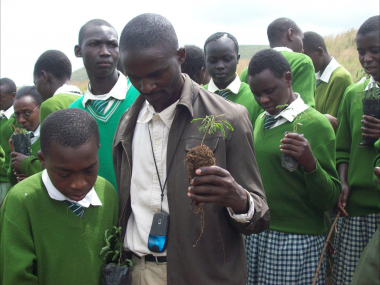The UN has launched the International Year of Biodiversity, warning that the ongoing loss of species around the world is affecting human well-being.World's biodiversity 'crisis' needs action NOW, says UN
Biodiversity nears 'point of no return'
The decline in the world's biodiversity is approaching a point of no return, warns Hilary Benn. In this week's Green Room, the UK's environment secretary urges the international community to seize the chance to act before it is too late

|
In 2002, the world's governments made a commitment to significantly reduce the rate of biodiversity loss by 2010.
Although it is hard to measure how much biodiversity we have, we do know these targets have not been met.
Our ecological footprint – what we take out of the planet – is now 1.3 times the biological capacity of the Earth.
In the words of Professor Bob Watson, Defra's chief scientific adviser and former chairman of the Intergovernmental Panel on Climate Change (IPCC), we are in danger of approaching "a point of no return".
So the action we take in the next couple of decades will determine whether the stable environment on which human civilisation has depended since the last Ice Age 10,000 years ago will continue.
To do this, we need to widen the nature of the debate about biodiversity. Flora and fauna matter for their own sake; they lift our spirits and nurture our souls.
But our ecosystems also sustain us and our economies – purifying our drinking water, producing our food and regulating our climate.
Climate change and biodiversity are inextricably linked. We ignore natural capital at our peril.
Interdependence
The UK and Brazil are hosting a workshop in preparation for the next UN Convention on Biological Diversity (CBD).
Representatives from more than 60 countries – from the Maldives to China – will attend the three-day event to discuss how we can ensure that the post-2010 targets stand a better chance of being met than those set in 2002.
 The number of species facing extinction continues to grow
|
The majority of those attending are from developing countries, including those with the rarest and greatest biodiversity. They need to be listened to.
It is easy to have principles when you can afford then – economics and ecology are interdependent.
So when it comes to biodiversity, we desperately need to start restoring links between science and policy, between taking action and evaluating it and between economies and ecosystems.
The big challenge will be for the real benefits of biodiversity and the hard costs of its loss to be included in our economic systems and markets.
Perverse subsidies and the lack of value attached to the services provided by ecosystems have been factors contributing to their loss. What we cannot cost, we don't value – until it has gone.
Investing in the future
Much greater concerted effort is needed to stop the plunder of our ecosystems.

|
Overfishing has reduced blue fin tuna numbers to 18% of what they were in the mid-1970s.
The burning of Indonesia's peat lands and forests for palm oil plantations generates 1.8bn tonnes of greenhouse gases a year, and demand is predicted to double by 2020 compared to 2000.
More than seven million hectares are lost worldwide to deforestation every single year.
The restoration of our ecosystems must be seen as a sensible and cost-effective investment in this planet's economic survival and growth.
I am optimistic. Talking about the danger of climate change has brought with it opportunities to tackle the biodiversity crisis.
While the 2010 targets have not been met, more than 160 countries now have national biodiversity action plans.
Mechanisms now exist for research, monitoring and scientific assessment of biodiversity, although we now need an Intergovernmental Panel on Biodiversity and Ecosystem Services to oversee progress in the same way the IPCC does for climate change.
One example of progress is the Brazilian Government's new target, which requires illegal deforestation to be cut by 80% by 2020.
Last year, deforestation rates in Brazil dropped by 45% against those of 2008, the largest fall since records began.
Other examples, closer to home, are the UK's Sites of Special Scientific Interest (SSSIs) – 89% are in a good or recovering condition.
Our ninth National Park, in the South Downs, was created last year and agri-environmental schemes are producing significant improvements in biodiversity.
2010 is the International Year of Biodiversity and later this year – in Nagoya, Japan – we will have the chance to halt the decline of our planet's biodiversity.
It is up to us to seize it.
Hilary Benn is the UK Secretary of State for Environment, Food and Rural Affairs
The Green Room is a series of opinion articles on environmental topics running weekly on the BBC News website
Do you agree with Hilary Benn? Is global biodiversity approaching a point of no return? How hopeful are you that we will be able to halt the rate of species loss? Are you optimistic about the future state of the Earth?
"Overfishing has reduced blue fin tuna numbers to 18% of what they were in the mid-1970s." Indeed. So it beggars belief that Mr Benn's own department now seems to be backing away from giving support to a trade ban on the species, does it not? Actions speak louder than words. If the UK government can't get it right on bluefin, no point lecturing anyone else about biodiversity decline!
William, London
I cannot understand why the decreased amount of photosynthesis on land and in the oceans is not counted as a possible cause of global warming, if there is any real warming. A vast amount of land has been cleared for development, that is, cities and monoculture farms, so land based photosynthesis and transpiration must have significantly decreased. This means that more of the incident radiation from the sun simply heats up the ground. We are told that the oceans are a mess of plastic and chemicals from sewerage plus debris. I suspect that this is causing less algal growth, again another absorber of the sun's energy. If 0.04% of the atmosphere in the form of CO2 is a cause of global warming then why not photosynthesis and transpiraton? Can anyone provide some comparitive figures on heat absorption by fauna and flora compared to atmospheric gasses?
Bevan Dockery, Perth, Western Australia
When people talk about population what they really mean is poor people 'over there'. The real problem is consumption and greed by the already wealthy. No one but Governments can stop the forests falling or the seas being emptied. Our fishing policy is a joke, and can only lead to one conclusion, and we must make the change to a non-deforestation driven agriculture. There is plenty of already converted land waiting to grow crops that is sitting abandoned. But of course that means that the businesses and governments do not get the value of the timber that they prize so dearly. And I agree entirely with Martin Jacobs. The Green community has got its priorities wrong by making every argument about climate.
Dr Dolittle, Cornwall, UK
The cutting of population is mandatory. There are now too many people for the planet to support.
We must have power and the hydrogen cell engine. In order to generate the power we need, we must use the power of the sun on massive batteries of solar cells encircling the globe and connected by a ring main also encircling the globe with spurs to north and south. It must be a WORLD grid. This will bring power to all countries. Deserts can then be irrigated and the rain forests restored. This massive project will give employment to ALL peoples around the earth. Hence hunger and deprivation can be banished. Don't say it is impossible. If Malaysia can supply 136kV to Sumatra beneath the South China Sea then we CAN build the world grid. Solar cells are, in development about where the internal combustion engine was in the 1890s. What militates against the project is one man's hatred of another chiefly in the name of religion. Moslem, Christian, Buddhist, Hindu, Shintoist etc. We ALL have to learn to be friends with one another. for the Project to be successful. This project I have outlined, once up and running, burns no fossil fuel and is pollution free. It does not depend on a finite source for, if the Sun dies, then we all die. This must be the greatest challenge faced by the Human Race since time began.
John Cupis, Timsbury, Bath, UK
what is there to disagree about – except, perhaps, the optimism? indeed, wary of being dubbed a catastrophist (catastrophists are so tiresome and they try to make everyone feel so guilty), environmentalists always end on a false note of optimism. Hilary Benn's note of optimism doesn't ring true. when we can disaggregate economics and politics from international concerns such as the environment, we might make progress. sadly, locked as we are into nation states, this will not come to be and the short-term vision of poticians and economists will bulldoze the long-term necessities of the environment. Hopeful, optimistic? What do you think?
stuart, maputo, mozambique
Can anyone name a species that has gone extinct in the last 50 years?
Neil McEvoy, Guildford, England
Having read the article I still fail to see how Mr Benn proposes to reconcile the obvious conflict of interests between environmental concerns and the economic growth of which, he speaks so reverentially. Surely fundamentalist market globalism is based on the core concept of exponential growth by the exploitation of finite resources? It is simply not possible for change to be enacted by the British political class. Their parties receive the lion's share of their funding from the very business interests who profit from the ongoing destruction of the planet. Why should we believe that the political class has suddenly experienced a change of heart and decided to stand with the people against big business? They've certainly never done it before.
Dr Michael Swann, Thurso, Scotland
Global biodiversity may well be approaching the point of no return but it's an issue that most people can't really do anything about. One of the defining aspects of rich biodiveristy is strong local differences, there is biodiversity, literally, on our doorsteps. The government need to pull their finger out and help local people protect and encouage their own areas, that includes people in the rainforest and people in the UK. Massive, money driven, global events are not the answer.
Mike, Manchester
why do the rich western countries not 'rent' vast tracts of third world land in order to protect it from having to be used for the income of the people.
jphndark, uk
Spot on! Now what are the BBC going to do to help educate people be part of the solution? It's not enough to have negative journalism now, we need educational and inspirational articles to show the lay person what they can do to help.
Stephen Hobbs, Bristol, England
Yes. Biodiversity, the preservation of forests, and the organic integrity of the oceans, and overpopulation are all far more important and immediate issues than CO2. The green movement has got its priorities wrong.
Martin Jacobs, Stockport UK
If we continue to be selfish it is not a problem. Then we must ask ourselves "do we care about our children or their childrens' future?" One would hope that we do care and therefore we should address the issue without delay. Hilary Benn is to be admired for his forthright statement.
Martin P Mannion, Cork, Ireland
This is all very well, but his Government's support for biofuels for transport is in direct collision both with world biodiversity and cutting net greenhouse gas emissions. It has meant the abolition of set-aside across Europe so valuable for biodiversity, and also is leading to more total imports of palm oil, being a major contributor to the expected catastrophic doubling of demand for palm oil he speaks of above. His Government has gone even further and awarded double ROCs for electricity generation from fresh vegetable oil, sparking a wave of planning applications for such power plants that can readily use palm oil, and inevitably will further increase the UK's 'overshoot' of net food imports, so exporting even more deforestation and hunger.
Jim Roland, London, UK
I am completely agreed with this article and I am giving a lot of thanks to the UK Secretary of State Hilary Benn. Of course, the decline of world's biodiversity is approaching a point of no return. As a Local Government Professional Civil Engineer I am to work with biodiversity while planning and implementing of any infrastructure development project. Due to the green house effect a lot of species of amphibians, plants and animals have been disappeared, which could not be return. And also others which still exists, their survival are so much vulnerable. As climate change and biodiversity are inextricable linked, so,it is very essential to arrange an international conference like Copenhagen summit. Although we now need an intergovernmental Panel on Biodiversity and Ecosystem services to oversee progress in the same way the IPCC does for climate change. Brazilian and UK Government have been taken tremendous initiative for the improvement of Biodiversity. I hope and believe that it would be possible to halt the rate of species loss. Yes, I am optimistic about the future state of the Earth.
Engr Salam, LGED, Kushtia, Bangladesh
And what is the main cause for this loss of bio-diversity? I'm no expert but would guess that's it mankind. With a global population increase of around 75 million people per annum is it any wonder that nature is losing out? Hilary Benn links loss of bio-diversity and global warming (man made global warming to be precise) but surely the ever growing number of people on the planet is the root cause? I appreciate how sensitive the subject is, but unless we bring population into the equation and discussion I fear the debate is not going anywhere meaningfull.
Peter, East Grinstead
The General Assembly of the United Nations has declared 2010 the international year of Biodiversity. Mr.Hilary Benn has done a great job by writing for the biodiversity. I too feel pain and helplessness in my bones when I see the plight of other creatures. I too consider myself very optimistic. But how can we remain optimistic at all the places? There are many powerful professionals including political leaders who are optimistic about infrastructural, industrial and agricultural growth rates. This optimism and penchant for the competitive norms is contrary to cause of biodiversity. If we look at the pressures of the existing trends, efforts to check human population and promotion for biodiversity come at less prior positions. Even these professionals too understand the importance of biodiversity but they succumbed to the pressures of the current trends. Just look at urban areas and the current model of development, one can easily make out that how much population pressure is there on the lands and oceans. We are constantly focussing on the result, not on the source. Even while raising critical issues we are more bothered about declining biodiversity, less worried about growing human population. We can not get success unless we restrict some of our optimism in those existing trends which are fatal for the balanced existence. I fully support the work of the author of this article. Some how, I feel we need a coordinated strategy more focussed on the source and reasonable focus on the result very urgently.
Sanjay Singh Thakur, Indore,India
All the depressing statistics and stories we read every day of deforestation and loss of ecosystems never appear to contain suggestions of what the ordinary person on the street can do: please tell us which products we should avoid buying, and name and shame those companies who are contributing to unnecessary destruction of the world's resources. I'm sure if people were made more aware, they would think twice before laying hardwood flooring or buying products that contain palm oil.
Rob Morton, Twickenham
Human beings have a nearly inexhaustable capacity for innovation and overcoming seemingly insurmountable barriers. I have no doubt that we will be adequate caretakers of the richness the earth.
Ronald kern, Marlborough Connecticut, usa
Loss of habitat and biodiversity is probably going to be the end of the world. Global warming is very likely much less of a threat to the future habitability of this planet. All of the extractable oil left in the ground WILL be extracted and burnt. Populations (of humans) WILL continue to skyrocket. 95% of all humans WILL act with shortsightedness to improve their lives, and their children's lives, by consuming more. This is as true of illegal Indonesian loggers as of Surrey stockbroker belt frequent flyers. I do not share Mr Benn's optimism, and I'm not sure he isn't just putting a brave face on things. Having faith in agencies and mechanisms to sort everything out nicely is not something history tells us is wise. As long as we have no enforcable global laws we will continue as a species to be irresponsible. The prospect of an all powerful global force is terrifying anyway, even assuming it is benign and clever enough to save the planet. My only hope is that we manage to develop a plentiful source of cheap clean power (fusion?). The next step down from that is to remember that in a million years the ecosystem should start to recover from all the toxic waste and runaway warming that wiped humans out. Grim or what? Once it sinks in we'll all go crazy and society will start to fall apart. 50 yrs from now we'll be living in isolated domes if we're one of the 1%. The rest? Hmmm. No bees, no fish, no fresh water, no coral reefs, no oil, no rainforests… jellyfish soup anyone? I'm not a natural pessimist, but I do have a habit of spotting things from further off than other people. Help me out here, tell me why I'm wrong?
Ben Johnson, Newcastle upon Tyne, UK
The ONLY way to preserve the ecosystems we utterly depend on is to CUT population growth initially and then cut population. ANY other suggestion just amounts to a lot of hot air in the end – literally – which makes matters worse. Only China has faced up to this so far. Nobody else even wants to even talk about it(not even Hilary Benn it seems)… It should be introduced urgently as a subject in primary schools worldwide(easy enough to do after all) so that at least people would grow up with the idea that maybe only one or two children is a GOOD IDEA and what the consequences will be(starvation, increasing genetic damage as a result of chemical pollution) if families continue to be larger than that. And that conversely with the voluntary control of population, with the knowledge we now have Earth could be a paradise as never before… Meanwhile 'I wish I liked the human race. I wish I liked its silly face. I wish when I was meeting one that I could say, 'What jolly fun' …'
Simon Morrison, Truro
Hilary Benn's assessment is true. Tragically, the obvious solutions are unpalatable for our materialistic society – for example, if the UK and other wealthy countries were to ban import of all non-recycled and non-FSC certified wood/paper products (from sustainably managed forests) and take similar action with other imported goods that are destroying the Planet's biodiversity, it would have almost no real impact on our standard of living and would have an enormous immediate positive impact on biodiversity and a sustainable future for our children and grandchildren. I live in hope but time is running out …..
Chris P, Ipswich UK
I think Hilary Benn's concerns are real. I am dismayed at a couple of things that he says. Firstly the idea that a UN super quango a la IPCC will improve the situation – it will manifestly tie all action into inaction and waste valuable resources that need channeling into real solutions on to nonsensical posturing. Secondly his persistent belief in Climate change – caused by co2 – the evidence for this is non-existent and the "inextricable" linking of this non problem to the very real problem of loss of habitat and bioduversity. "Inextricable" to me is inexplicable. They are manifestly unrelated – and linking the two ensures that no effective action on biodiversity is possible. So a bleak article. It identifies a problem – destroys its own logic and ultimately comes up with a non-solution
Gary Winter, Strathmiglo Fife
I am not optimistic about biodiversity, and therefore us too, as we are a part of it. We are like children who wish that everything will remain the same, without us having to do a thing. We are dreaming our planets life away. If we as a species grew up, looked around u,s and took right action, we would still have only a little time to halt the losses, but at least we will have tried. If we put the effort we put into acquisition on an individual level, and war on a global level, and turned all that mental energy that characterizes us as humans, we could do this. But I am still not optimistic that we will……….
L Ashford, Birmingham
My understand of the principles of Evolution is that species are continually mutating to take advantage of different niches and habitats. This might not be as quick as the losses but it seems to show that life will find a way. Politicians talk all the time about tipping points but its an opinion, do we really know? We have vastly modified the landscape of the British Isles and, as a consequence, the biodiversity within them. It must ring a little hollow to developing countries when we telling them they can't do what we have. There have been vastly different climates during the history of the earth. During each climate life has expanded to fill each nook and cranny. Even if we wipe out 99.99% of species, over time, new species will evolve to replace them. This tipping point, and the one over climate change, is just a measure of the arrogance of mankind. We believe so much that we are masters of everything, and have the ability to manage everything. So far we've not managed to back this up at all.
Mick Sheppard, York, UK
The country would be in a much better state if Hilary Benn was Prime Minister. He is brilliant at a constituency level and assured and respected on a national and international level. Surely the best proof that not all politicians are the bane of all evil!
Lewis Smith, Leeds
I agree we need to seize the opportunity to stop the damage to nature and biodiversity. I would like to know why nobody in the UK takes seriously a plan by the ecuadorian government to leave 6000 million dollars worth of oil untouched in a very highly biodiverse area of the Amazon, known as Yasuni National Park and one of the most important natural reserves of the world. This 2 year old plan to leave the oil in return for contributions from the international community is now in serious jeopardy as too few countries have been negotiating the details of the plan, such as Germany and Spain. What about the rest? Also why is this important plan only being broadcast in the spanish version of the BBC?
Victor Velecela, Edinburgh
Hilary!When are you going to grasp the population nettle?The world cannot sustain its present population to our standard of living never mind the 9 billion that we seem to accept as inevitable.Big business wants more and more people,the planet doesn't.When you're grandchildren ask what became of the millions of species about to be lost how will you explain it?
steve johnson, whitwick,leics
Mr. Benn, can I direct you to the recent comments of the PM, your party leader: He said: "A fair society is one where everyone who works hard and plays by the rules has a chance to fulfil their dreams whether that's owning a bigger house, taking a holiday abroad, buying a new car or starting a small business." Those are definitely 3 things – under most circumstances 4 – that, under the exponential growth model that governments drool over, typically have a heavy toll on the environment. So what's your priority?
Ryan, Glasgow










There are no comments published yet.